Category Archives: Test translation and localisation
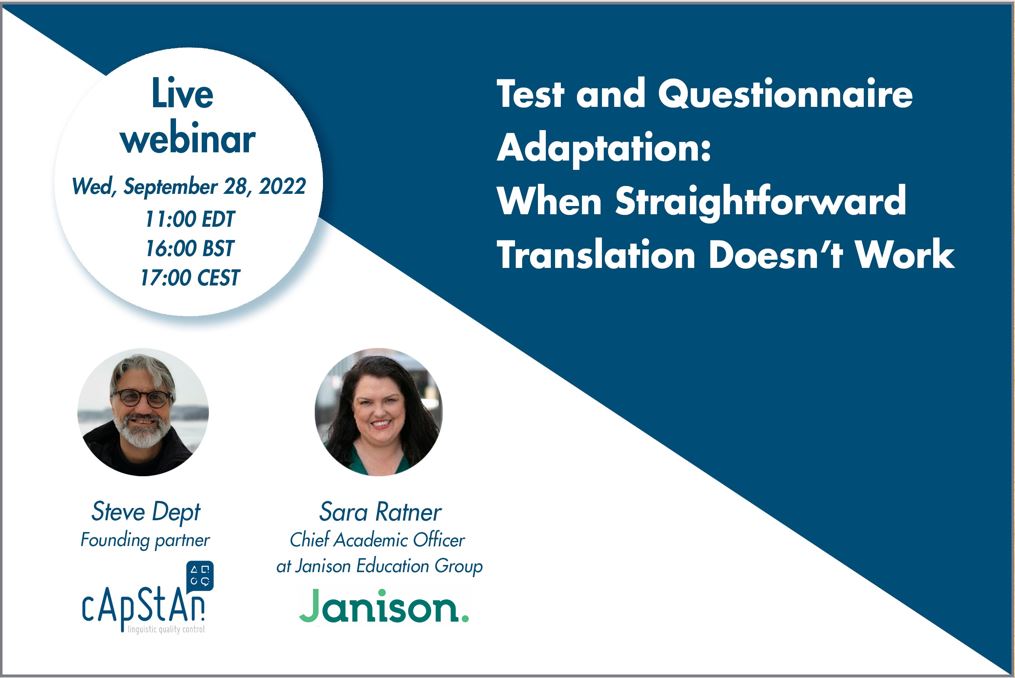
Live Webinar | Test and Questionnaire Adaptation – When Straightforward Translation Doesn’t Work
If “how many sides does a hexagon have?” translates to “how many sides does a six-sided figure have?” in language X, then the translated item will not measure the same knowledge or skill. In benchmarking studies, however, comparability across different language versions of an item or question is not merely an objective, it is a …
“Live Webinar | Test and Questionnaire Adaptation – When Straightforward Translation Doesn’t Work”
Read More
Why TAUS’ 3-step recipe for better machine translation does not work for all
It is true that (much) more than half a century of research into machine translation (MT) has not resulted in a technical solution that comes close to “human parity”, contrary to claims based on obsolete metrics such as BLEU scores. It is also true that we have witnessed significant progress in the quality of raw …
“Why TAUS’ 3-step recipe for better machine translation does not work for all”
Read More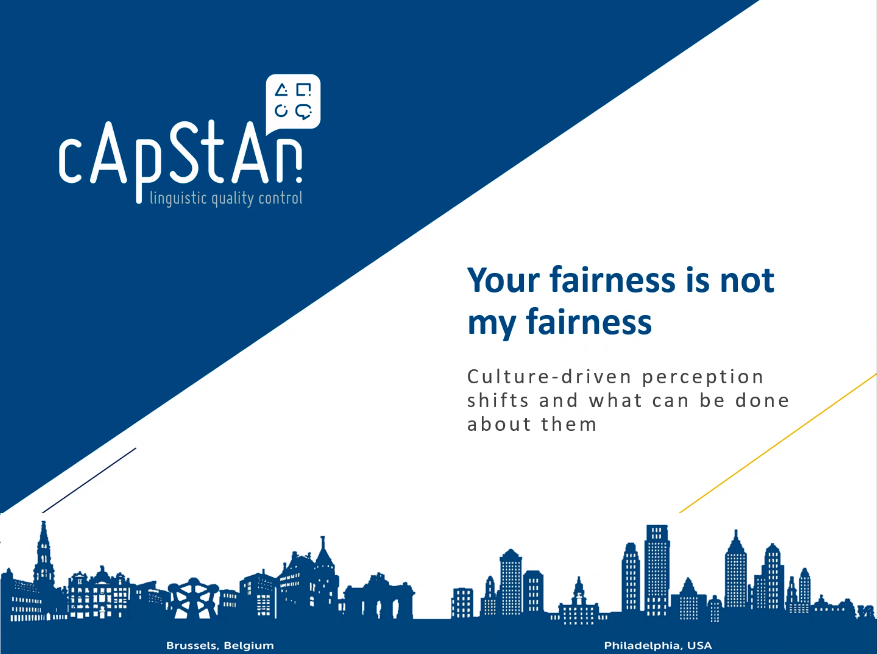
“Your fairness is not my fairness”: culture-driven perception shifts and what can be done about them
What is meant by “fairness” in tests? How is “fairness” related to “validity”? How do you preserve fairness of a test across languages and cultures in multilingual assessments? How do different cultural backgrounds influence fairness and test results? These are some of the issues addressed by cApStAn co-founder Steve Dept at a recent talk as …
Read More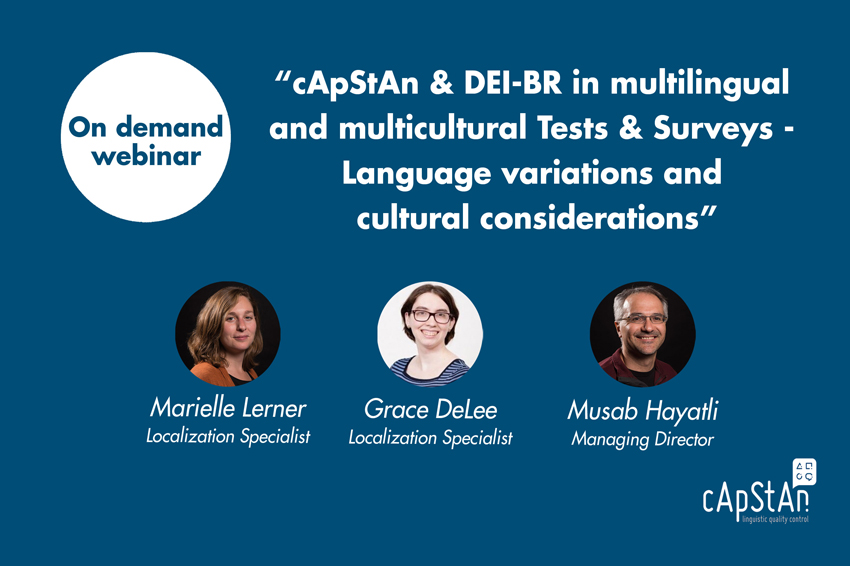
On-Demand Webinar | cApStAn & DEI-BR in multilingual and multicultural Tests & Surveys – Language variations and cultural considerations
Awareness of Diversity, Equity and Inclusion in tests, assessment, polls and surveys is growing, becoming increasingly indispensable as it both ensures the fairness of tests and the reliability for any data collection instrument. It is a very positive move! We at cApStAn are not DEI-BR experts per se. We are a language company which partners …
Read More
Why involving language services providers (LSPs) in the translation platform design is important
by Roberta Lizzi – Senior project manager, external human resources director When multinational surveys and assessments go digital, content creators, principal investigators or test owners tend to rely on platforms, not only for delivery, but also for the management of the translation process. These platforms can be off-the-shelf or developed in-house. As a consequence, language …
“Why involving language services providers (LSPs) in the translation platform design is important”
Read More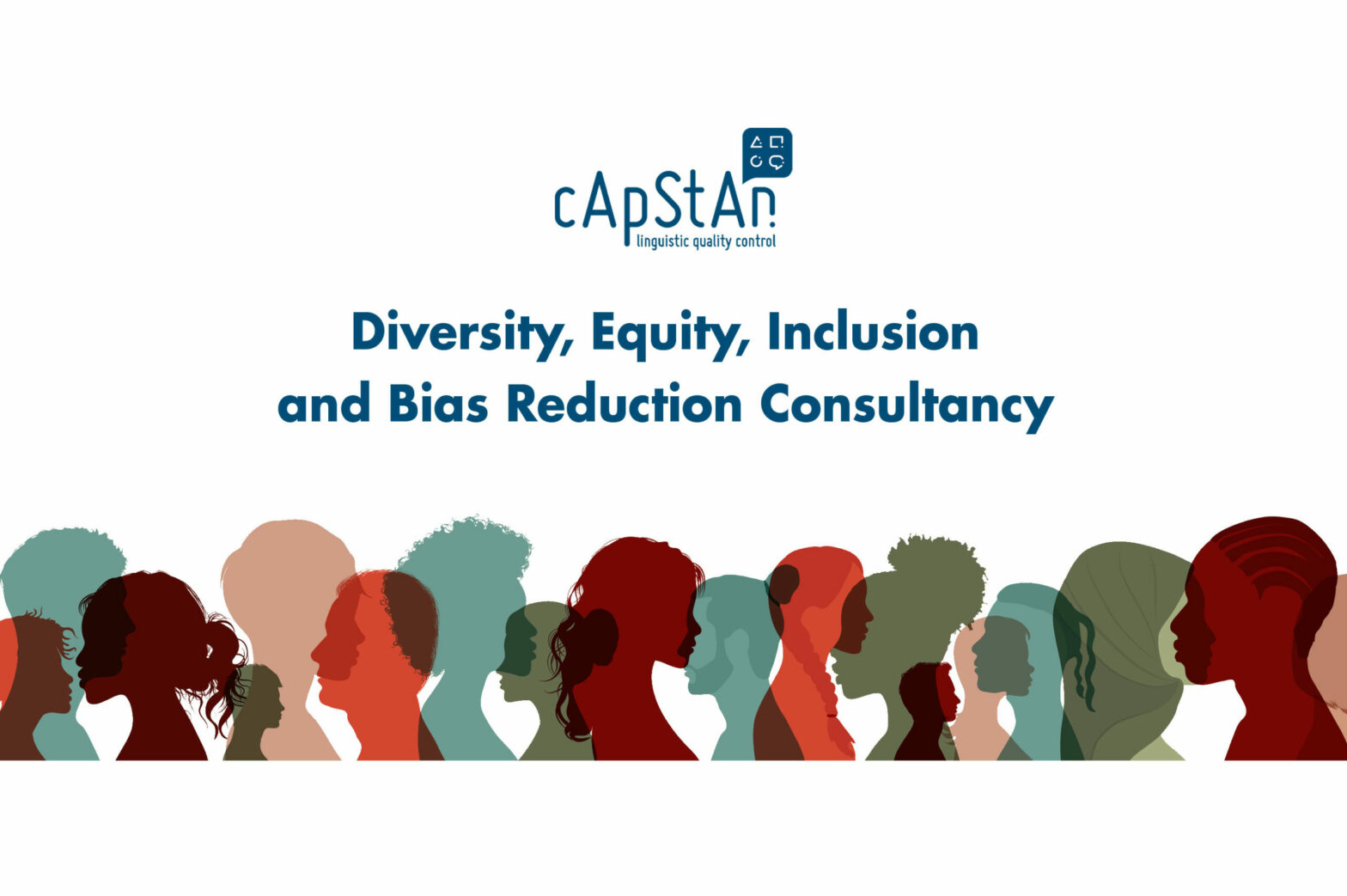
Diversity, Equity, Inclusion & Bias Reduction Consultancy
Looking at standardized tests and questionnaire content through the lens of Diversity, Equity, Inclusion and Bias Reduction (DEI-BR) Standardized tests and questionnaires are used in a variety of contexts such as admission to university, certification, accreditation, or hiring. Fairness, validity and reliability are objectives that every testing organisation strives to address. The processes in place …
“Diversity, Equity, Inclusion & Bias Reduction Consultancy”
Read More
Do SMEs and Linguists mix like Water and Oil?
by Steve Dept, Founding Partner The idiom “these folks mix like water and oil” usually refer to an insuperable difficulty for certain people to blend and see eye to eye with one another. When we were asked to verify the translation of assessments for which it was obvious that linguists alone would not have the …
“Do SMEs and Linguists mix like Water and Oil?”
Read More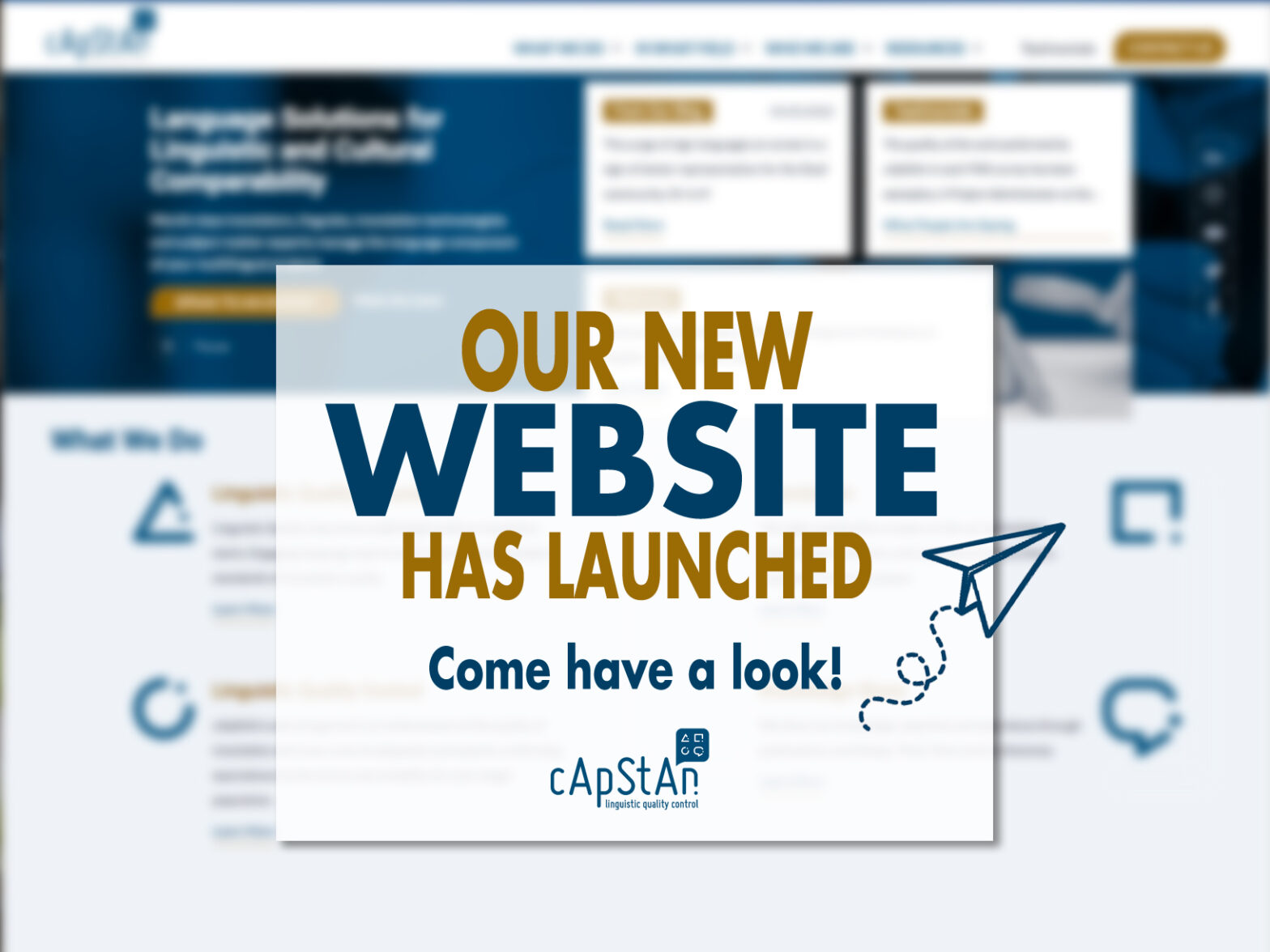
cApStAn’s new website has launched!
Et voilà! We are now online! After months of hard work we are delighted to announce the launch of our new website, which reflects our mission, values and brand, and showcases the best of our linguistic services and the great team behind it all. The new features are tailored to help you find the right …
“cApStAn’s new website has launched!”
Read More
Translatability and Cultural Suitability Workshops for Test Authors
Steve Dept, cApStAn CEO It may take a psychologist or a subject matter expert to be a test author and develop good questions, but nothing speaks against that person being monolingual, right? It doesn’t prevent them from doing a sterling job. Anglo-Saxon items writing practices have dominated the assessment universe for over half a century, …
“Translatability and Cultural Suitability Workshops for Test Authors”
Read More
How to best approach the translation and adaptation of tests and surveys for gendered languages
by Pisana Ferrari – cApStAn Ambassador to the Global Village Standardized tests and assessments are used in a variety of different contexts: admission to schools and universities, professional certifications, hiring, or collecting information about background variables, for example, and can come in more than one language. In this case, test or assessment developers will need …
“How to best approach the translation and adaptation of tests and surveys for gendered languages”
Read More
Disentangling Proficiency in Programming from Proficiency in English: Codility meets cApStAn
by Pisana Ferrari – Branding and Social Media Manager If the level of language proficiency of a skills assessment is too high, this may hamper the correct measuring of these very skills. For example, a skilled programmer may not pass a test due to the high threshold of English proficiency that is required in order …
“Disentangling Proficiency in Programming from Proficiency in English: Codility meets cApStAn”
Read More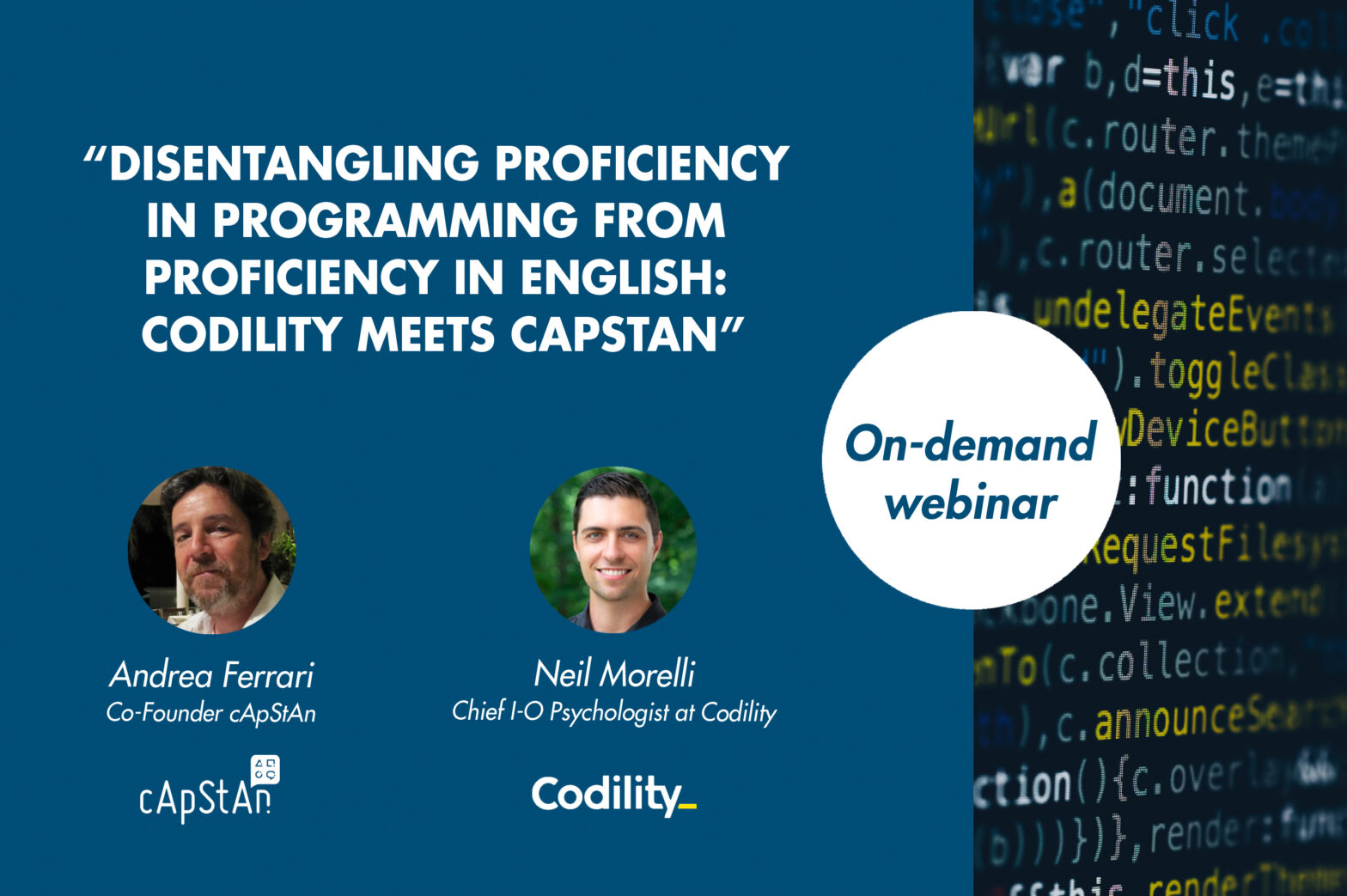
On-Demand Webinar | Disentangling Proficiency in Programming from Proficiency in English: Codility Meets cApStAn
Codility is the #1 rated recruitment platform for developers, helping world-class companies the likes of Microsoft, Intel and American Express to assess candidate programmers via skills-based coding tests. The tests are administered in English, but often the candidates are not native English speakers. Hence the “pain point” identified by Codility: a too high level of …
Read More